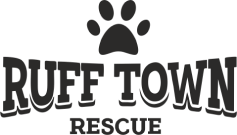By Nancy Hierl, CEO & Founder of Ruff Town Rescue

At Ruff Town Rescue, we think that dogs aren't merely pets—they're family. You're either an old dog lover or a new pet parent who understands how much we care for our furry friends. We provide them with the best dog food, pamper them with yummy dog treats, and do everything we can to protect them and keep them happy. But when accidents occur—and they will—are you ready?
One of the most overlooked essentials in a dog household is a well-stocked pet first aid kit. As someone who has had her fair share of health issues with all of our rescues. I’ve learned that being prepared can make all the difference. A solid first aid kit isn’t just for emergencies—it’s peace of mind in a box.
In this guide, I’ll walk you through exactly what you need in your kit, how to treat common injuries at home, and tips every pet lover should know. Whether you’re at home, on a road trip, or just enjoying the outdoors, this information could help you save your dog’s life.
🐶 Why Every Pet Owner Needs a First Aid Kit
Accidents don't knock before coming in—they occur when you don't expect them. Your cute dog may accidentally step on a broken glass, get bitten by an insect, or have an unexpected upset stomach. These simple situations can become emergencies if not managed well.
Having a pet first aid kit allows you to:
- Act immediately in case of injury
- Ease your dog’s pain before reaching a vet
- Avoid infections and complications
- Keep calm in stressful situations
Trust me—when you're dealing with a bleeding paw or a limping leg, having all the essentials within arm’s reach can feel like a lifesaver.

📦 What to Include in Your Pet First Aid Kit
Your dog’s or cat’s first aid kit should be comprehensive but compact. Here’s a list of must-haves I always recommend to our Ruff Town Rescue community:
1. Wound Care Essentials
- Pet-safe antiseptic solution – For cleaning cuts and scrapes
- Sterile gauze pads and bandages – Wrap wounds gently without restricting circulation
- Antimicrobial ointment – Aids healing and prevents infections
- Blood Clotting Powder - Helps stop bleeding. It can be used on wounds, lacerations or in the unfortunate event a nail gets trimmed to short.
2. Medical Tools
- Tweezers – For removing splinters, thorns, or ticks
- Blunt-tip scissors – Safely trim fur around wounds or cut bandages
- Digital thermometer – Measure your dog’s temperature (normal is ~101–102.5°F)
3. Emergency Medications
- Hydrogen peroxide (3%) – Used to induce vomiting only when instructed by a vet
- Anti-diarrheal medication – Vet-approved for dogs only
- Electrolyte solution – For dehydration or heat exhaustion
- Benadryl - To prevent mild allergic reactions, before getting to the vet. The dosing is 1mg for every pound. 5 pound dog would receive a 5mg dose and so on. **Only use tablet form never liquid.
- Steamed Rice, Raw Goat Milk (can be found at most pet stores or farmers markets), and Sodium Free Chicken Broth - Helps soothe an upset tummy
- Colloidal Silver - non toxic "disinfectant" for dogs. Uses included a variety of skin issues including burns, hot spots, and insect bites.
- PLEASE CONTACT YOUR VET BEFORE GIVING YOUR PETS ANY HUMAN MEDICATION
4. Comfort Items
- Tasty dog treats – To calm your pup during first aid (but skip treats if your dog is vomiting)
- Elizabethan collar (cone) or surgery suit – Keeps dogs from licking or biting at wounds
5. Information and Backup
- First aid guide – A printed pet first aid manual for quick reference
- Vet contact card – List emergency numbers and addresses
Pro tip: Store all these items in a waterproof, labeled container. Keep one kit at home and another in your car for travel.

🏡 How to Treat Minor Pet Injuries at Home
While serious injuries always require veterinary care, minor cuts, scrapes, or bug bites can often be treated at home.
Step 1: Stay Calm
Dogs are incredibly sensitive to our emotions. Stay calm and speak gently to keep your dog at ease.
Step 2: Clean the Wound
Rinse the wound gently with lukewarm water to remove dirt or debris. Use a pet-safe antiseptic to disinfect the area. Saline solution is a good choice.
🚫 Avoid human antiseptics like hydrogen peroxide or alcohol unless directed by a vet—they can irritate your dog’s skin.
Step 3: Apply Ointment and Bandage
After cleaning, apply antimicrobial ointment and cover the area with sterile gauze. Use a bandage like Vet Wrap to secure it—snug but never too tight. Always start wrapping at the toes and work upward.
Check the wound daily. Replace bandages and clean the wound at least once a day or as needed.
Step 4: Prevent Licking
Dogs instinctively lick their wounds, which can cause infections or delayed healing. Use an Elizabethan collar (a cone) or a surgery suit to stop this behavior while your dog recovers.

🔁 When to Call the Vet
Even with the finest pet first aid kit, certain signs necessitate immediate professional care:
• Difficulty breathing
• Severe or uncontrollable bleeding
• Collapse or inability to walk
• Persistent vomiting or seizures
• Heatstroke or dehydration symptoms
When in doubt, always contact your vet. A quick phone call can make all the difference.
🛡️ Creating a Safe Home for Your Pup
Prevention is better than cure. As pet owners, we need to make our homes and outdoor areas safe and dog-friendly. Here's how:
• Store all pet food, medicine, and cleaning products out of reach.
• Fence your yard and look for sharp objects and poisonous plants.
• Utilize barriers or gates to limit access to hazardous zones.
• Store chewable hazards (such as wires or small toys) out of reach.
These simple actions can prevent a trip to the emergency vet and keep your dog’s tail wagging all day long.

🐕 Treats That Support Health & Recovery Naturally
While recovering—or even as a nutritious daily snack—it's critical to provide your dog or cat with treats you can rely on. At Ruff Town Rescue, we believe in all-natural, single ingredient treats that benefit your pet's overall health without the junk.
Here are a few of our best sellers, loved by dog lovers everywhere:
🦴 Chicken Breast Treats for Dogs – Lean, high in protein, and perfect for pups of all sizes
🐄 Beef Heart Treats for Dogs – Rich in iron and essential nutrients for muscle health
🐟 Silver Carp Fish Dog Treats – A crunchy, healthy snack loaded with omega-3s
These pet treats contain nothing but pure, wholesome goodness—no fillers, no preservatives, and nothing artificial.
📅 And since it’s National Pet First Aid Awareness Month, it’s the perfect time to give your furry friend the clean nutrition they deserve while celebrating their health.
✨ Shop our full collection:
All-Natural, Single Ingredient Pet Treats
– Chicken Breast Treats for Dogs – $13.99 USD
– Beef Heart Treats for Dogs – $15.99 USD
– Silver Carp Fish Dog Treats – $15.99 USD

❤️ A Message from Ruff Town Rescue
At Ruff Town Rescue, we've experienced the real difference that preparation makes. We provide our rescues with high-quality dog food, affection, and training. Safety planning, though, frequently takes a backseat.
Having a dog/pet first aid kit is not limited to emergencies—it's part and parcel of being a responsible pet owner.
As a devoted dog and cat mom, I urge every pet parent to prioritize safety. Whether you're an experienced dog lover or a brand-new pet parent, being ready saves lives.
"Your pet depends on you for more than food and cuddles. Be ready for anything. Start with a first aid kit. It’s one small step toward a lifetime of care."
— Nancy Hierl, CEO & Founder, Ruff Town Rescue







